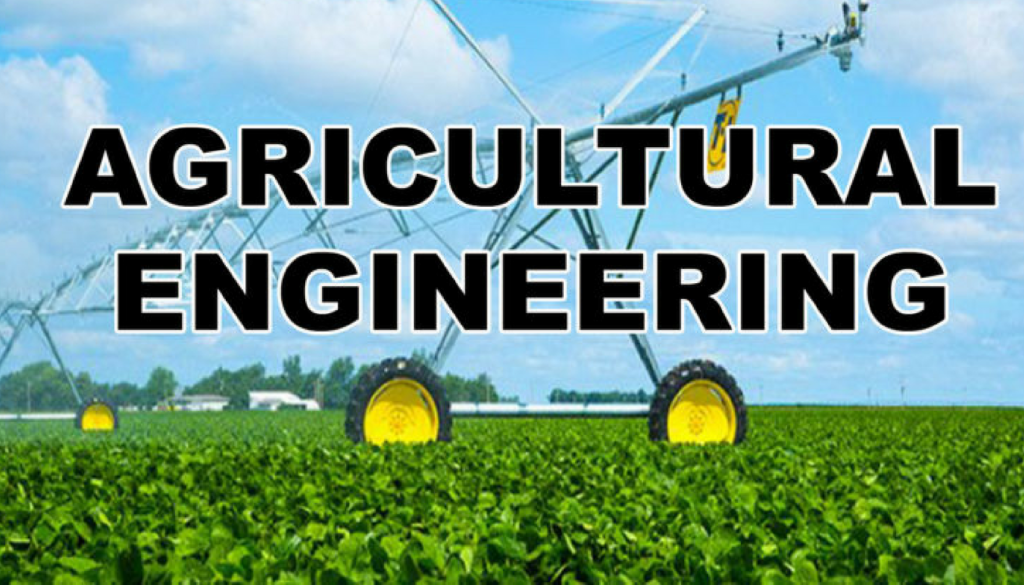
Agricultural engineering is an interdisciplinary field that combines principles of engineering, biology, and agriculture to improve farming practices and agricultural systems. The discipline focuses on the design, development, and implementation of systems and technologies that enhance the efficiency, sustainability, and productivity of agricultural operations. Agricultural engineers work on a wide range of projects, from designing equipment and machinery to developing methods for soil and water conservation, irrigation, and crop management.
Course Overview
An agricultural engineering course provides students with a solid foundation in engineering principles, biological sciences, and agricultural practices. It equips them with the skills to design and manage systems for the production and processing of food, fiber, and other agricultural products.
Key Areas of Study
-
Soil and Water Engineering
- Focuses on the management and conservation of soil and water resources.
- Topics: Soil mechanics, hydrology, irrigation systems, drainage systems, erosion control, and water resource management.
-
Agricultural Machinery and Power
- Involves the design and optimization of machinery and equipment used in farming.
- Topics: Tractors, harvesters, planting equipment, machine design, automation, and precision agriculture technologies.
-
Farm Structures and Environmental Control
- Design and construction of agricultural buildings and facilities.
- Topics: Farm buildings, storage structures, greenhouse design, livestock housing, and environmental control systems (temperature, humidity, ventilation).
-
Food and Bioprocess Engineering
- Focuses on the processing and preservation of agricultural products.
- Topics: Food processing, post-harvest technology, bioprocessing, fermentation, bioenergy production, and waste management.
-
Agricultural Systems and Management
- Study of agricultural production systems and their management.
- Topics: Farm management, logistics, supply chain management, decision support systems, and sustainable agriculture practices.
-
Renewable Energy and Bioenergy
- Exploration of renewable energy sources and their application in agriculture.
- Topics: Solar energy, wind energy, biofuels, biomass energy, and energy efficiency in agricultural operations.
-
Precision Agriculture and Smart Farming
- Application of technology and data analytics in farming to optimize crop production and resource use.
- Topics: Remote sensing, GPS, GIS, IoT in agriculture, data analytics, and automation.
-
Environmental and Ecological Engineering
- Focuses on sustainable agricultural practices and environmental protection.
- Topics: Conservation practices, pollution control, ecological modeling, and climate change mitigation.
Course Structure
A typical agricultural engineering course is structured over several years, including foundational courses in mathematics, physics, and biology, followed by specialized courses in the key areas of study. The curriculum may include:
-
Foundation Courses
- Mathematics: Calculus, statistics, linear algebra, differential equations.
- Physics: Mechanics, thermodynamics, fluid mechanics.
- Biology: Plant biology, animal science, microbiology, ecology.
- Chemistry: General chemistry, organic chemistry, soil chemistry.
-
Core Agricultural Engineering Courses
- Introduction to agricultural engineering
- Soil and water conservation engineering
- Agricultural machinery and equipment
- Irrigation and drainage systems
- Food and bioprocess engineering
- Precision agriculture and technology
-
Laboratory and Practical Work
- Hands-on experience with machinery, fieldwork, laboratory experiments, and data collection.
-
Projects and Research
- Capstone projects, internships, and research projects, often in collaboration with agricultural industries, government agencies, or research institutions.
-
Elective Courses
- Students can choose electives based on their interests, such as renewable energy, aquaculture, or agroecology.
-
Interdisciplinary Studies
- Integration of knowledge from environmental science, economics, and management to address complex agricultural challenges.
Career Opportunities
Graduates in agricultural engineering can pursue a variety of careers, including:
- Farm Machinery Design and Manufacturing: Designing and developing machinery and equipment for farming operations.
- Irrigation and Water Management: Designing and managing irrigation systems and water resources for agriculture.
- Environmental and Conservation Engineering: Working on projects related to soil conservation, water quality, and environmental protection.
- Food Processing and Safety: Developing processes and systems for food preservation, packaging, and safety.
- Renewable Energy and Bioenergy: Developing and implementing renewable energy systems for agricultural use.
- Precision Agriculture and Technology: Working with advanced technologies to optimize agricultural production.
- Research and Development: Conducting research to develop new technologies and methods for sustainable agriculture.
- Consulting and Management: Providing expertise and guidance on agricultural projects and operations.
Top Institutions Offering Agricultural Engineering
Many universities worldwide offer high-quality agricultural engineering programs. Some of the top institutions include:
- University of California, Davis (UC Davis), USA
- Cornell University, USA
- Purdue University, USA
- Wageningen University & Research, Netherlands
- University of Illinois at Urbana-Champaign, USA
- Texas A&M University, USA
- University of Reading, UK
- China Agricultural University, China
- Indian Agricultural Research Institute (IARI), India
- University of Melbourne, Australia
Conclusion
Agricultural engineering is a vital field that addresses the challenges of feeding a growing global population sustainably. The discipline combines engineering and biological sciences to innovate and improve agricultural practices, ensuring efficient use of resources and environmental protection. Graduates are well-prepared to contribute to diverse sectors, from farm machinery design to environmental conservation, making a significant impact on the agricultural industry and beyond.
